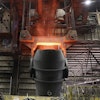WASHINGTON (AP) — U.S. factory production rose in December as manufacturers churned out more furniture, computers and steel, offsetting a small decline in autos.
The Federal Reserve says factory production increased 0.3 percent last month, the fourth straight gain. The increase comes after total output finally passed its pre-recession peak in November.
The figures released Friday suggest that U.S. manufacturers are adding modestly to economic growth, even as their overseas markets shrink. Most analysts are counting on Americans' appetite for cars, electronics and appliances to drive greater factory output.
Overall industrial production, which includes mining and utilities, slipped 0.1 percent last month. Utility output plummeted 7.3 percent, as an unseasonably warm December lowered demand for heating.
Mining output, which includes oil and gas production, rose 2.2 percent after 2 months of declines. The Fed said that oil and gas extraction rose, but the increase was limited by declines in new drilling.
Overall industrial production increased in 2014 at the fastest pace in four years. That's pushed up the percentage of industrial capacity being used to 79.7 percent, just 0.4 percentage points below its four-decade average.
That suggests that manufacturers, in order to ramp up production further, will have to expand their plants, which would give a solid boost to the economy. Otherwise, higher demand will likely push up prices, potentially leading to inflation.
Recent reports on U.S. manufacturing have been mixed, but overall they point to modest growth.
Factory activity expanded at a solid pace last month, according to a survey by the Institute for Supply Management, but much more slowly than in November. The survey found that measures of orders and production grew at a weaker pace.
Meanwhile, manufacturers in New York state expanded more quickly in January than the previous month, according to a survey by the Federal Reserve Bank of New York, released Thursday. Also Thursday, another survey found manufacturers in Philadelphia grew more slowly.
And orders for U.S. manufactured goods fell in November, the government said last week, as factories saw less demand for industrial machinery and primary metals.
U.S. manufacturing is being challenged by a turbulent global economy. Japan has dipped into recession. Tepid growth has trapped much of Europe. China, the world's industrial behemoth, is trying to tighten credit and reform its opaque financial sector.
The rising value of the dollar against other currencies makes U.S. products more expensive abroad, meaning that U.S. manufacturers will need to rely on domestic demand for growth.






















